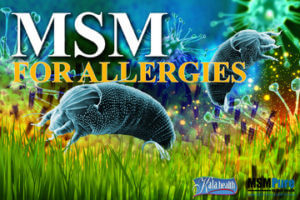
Did you know that MSM has demonstrated anti-allergic properties? For decades, a small but significant segment of the MSM consumer base has used MSM primarily for treating allergies. However, it’s only been relatively recently that scientists have begun understanding why MSM works in this way. This article will explain the science behind how MSM fights allergies and why it might be the right choice for you.
Discovering MSM’s Effectiveness Against Allergies
For years, people who took MSM for joint pain or other reasons reported an unintended but welcome side-effect; MSM seemed to be making their allergies decrease or in some instances, disappear entirely. As this anecdotal evidence became more and more accepted as a benefit of MSM, some people began buying and using MSM for the express purpose of treating their severe allergies. Others increased their daily doses during allergy season. Many found that MSM gels and creams were effective in treating allergy-related breakouts on their skin. Others found that giving MSM supplements to their pets solved chronic scratching or paw-biting problems that veterinarians said could only be fixed with powerful and expensive steroids.
Yet while it was becoming more widely known that MSM was effective against allergies, there was no unified explanation for why this was. Some theorized that sulfur deficiencies reduced the body’s allergic defenses and that MSM simply restored nutritional balance, correcting the problem. Some thought that oxidation worsened allergies and that MSM’s proven anti-oxidant properties was responsible for the improvements. The most common theory was that MSM acted as a histamine inhibitor, reducing the body’s excessive production of histamine in response to allergic stimuli. Yet until the mid-2000s, nobody seemed to have a definitive answer. Among people promoting MSM to one another, it became common to hear “I don’t know why this helps my allergies, I just know it does!”
With all of the anecdotal testimonies of MSM’s effectiveness against allergies continuing to mount, several groups of scientists independently decided to find out what, if anything, MSM was doing in the body to reduce allergic sensitivities. What they found was surprising.
How Does MSM Work Against Allergies?
In 2002, and 2003, the Journal of Alternative and Complementary Medicine published the results of two studies that proved MSM’s effectiveness against allergies. The first (“A multicentered, open-label trial on the safety and efficacy of methylsulfonylmethane in the treatment of seasonal allergic rhinitis,” Barrager E, Veltmann JR Jr, Schauss AG, Schiller RN J Altern Complement Med, 2002 Apr; 8(2):167-73) found that OptiMSM® supplementation at 2,600 mg to persons with allergic rhinitis (seasonal allergies) reduced the respiratory problems associated with rhinitis. The researchers found that the benefits of OptiMSM® were noticeable after 7 days of supplementation, increased until the 14th day, and then remained steady throughout the duration of the study. A year later, these results were replicated in another study that this time also corrected for the lack of detailed pollen counts in the previous study (“Methylsulfonylmethane as a treatment for seasonal allergic rhinitis: additional data on pollen counts and symptom questionnaire” Barrager E, Schauss AG, J Altern Complement Med, 2003 Feb; 9(1):15-6.)
The surprising finding of these studies was that the histamine levels in the subjects who were taking OptiMSM® remained the same as those not taking OptiMSM®, even as their allergy symptoms decreased. This finding seemed to undercut the theory that MSM hindered histamine production.
Two years later, Japanese researchers testing MSM’s anti-inflammatory properties in mice noted another surprising relation between MSM and histamine (“Anti-inflammatory effect of methylsulfonylmethane (MSM) in mice,” Hasegawa T, Ueno S, Kumamoto S 2005, Jpn Pharmacol Ther, 2005;33(12):1217–1223.) The researchers gave lab mice 2.5% OptiMSM® in solution, and then exposed them to various stimuli to measure their inflammatory responses against a control group of mice that were not getting any supplemental OptiMSM®. When the researchers exposed the mice to UV light, they found that the mice taking OptiMSM® experienced less inflammation. When they gave the mice ovalbumin injections, the mice taking OptiMSM® suppressed the immediate-phase swelling reaction. And most surprisingly, when they gave the mice histamine injections, the mice taking OptiMSM® exhibited significantly less scratching behavior.
The finding of this study confirmed that allergic relief from MSM was not due to the body producing less histamine, since if that were the case, the effects of MSM would not have registered when histamine was injected by a syringe.
To interpret these results, scientists began looking more holistically at the broader findings of MSM research in different categories. What they realized is that MSM’s effectiveness against allergies came from several different aspects, particularly its anti-inflammatory properties. Histamine is involved in the inflammatory response, so MSM’s anti-inflammatory properties actually reduces the harmful result of the body’s excessive histamine production in response to allergic stimuli. But MSM doesn’t stop working against allergies there. Researchers found that the sulfur deficiency theory actually had some validity to it when they discovered that protein and sulfur-rich diets helped people with allergies. MSM’s anti-oxidant properties also likely play a role in its benefit to those with allergies, as does its effect of making cell walls more permeable, which speeds the body’s expulsion of allergens.
The net effect of all of these factors is a supplement that can safely reduce allergic responses to all kinds of allergic stimuli. While MSM is not a magic bullet and will not work fast enough to reduce the danger of life-threatening allergies (such as those to nuts, shellfish, or bees) MSM will work well against many types of allergies when taken by mouth at normal daily doses, and it is also effective against skin rashes when applied directly as a cream or gel. (For maximum effectiveness, those using MSM topically should also take it by mouth). Effects will begin to be noticed after about a week and will continue to increase over the first couple of weeks. The body does not build up tolerance to MSM, so it can be used safely for many years or even decades without losing effectiveness. And MSM is safe. You can use it with any drugs your doctor may have prescribed without worrying about contraindications. MSM is all natural and in your diet already, and there have been no reported allergic responses to MSM.
The Kala Health Pledge for Quality



 LIMITED-TIME OFFER for our Social Followers:
LIMITED-TIME OFFER for our Social Followers:  Sign up for email updates. First time subscribers, SAVE 15% on your first online order & receive a free Gift with your purchase!
Sign up for email updates. First time subscribers, SAVE 15% on your first online order & receive a free Gift with your purchase!